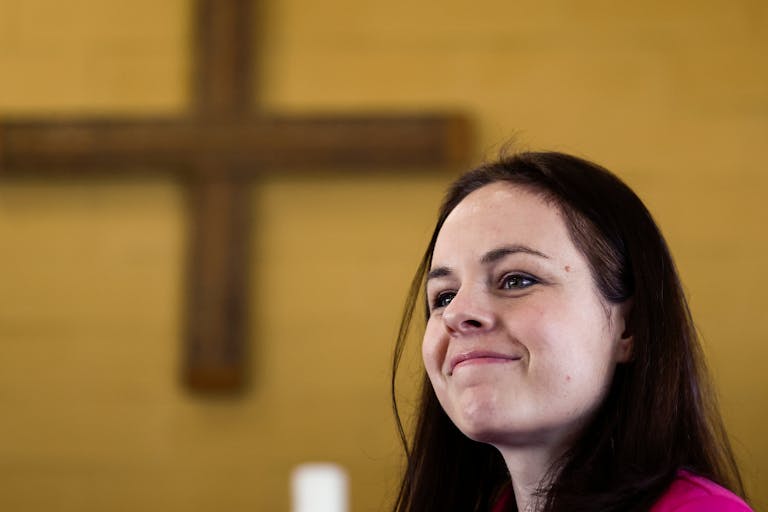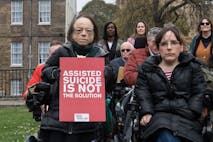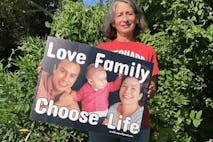
Lawmaker blasted for opposition to silent prayer ban in Scotland
Bridget Sielicki
·
Scotland pro-life groups unify to oppose liberalization of abortion law
Fear of the potential liberalization of Scotland’s current abortion law has drawn together an alliance of Catholic, Protestant, and Muslim pro-lifers under an umbrella coalition known as “Don’t Stop A Beating Heart.”
Currently, abortion is allowed up to 24 weeks in the UK. But the pro-life group, spearheaded by the Society for the Protection of Unborn Children (SPUC) Scotland, is concerned that a move to allow Scotland to decide its own abortion law will cause even those late-term restrictions to be eliminated.
John Deighan of SPUC Scotland explains:
The rights of the unborn child are facing new threats with the impending devolution of powers to the Scottish Parliament from Westminster. Already, well in advance of the transfer of legislative authority, we are hearing a clamour for further extension of the existing, excessively liberal law. This could see abortion legalised from the existing 24-week limit, in most cases, up until the point of birth.
In response to these deeply disconcerting demands, pro-life supporters from different backgrounds, people of faith and none, in addition to concerned organisations and individuals have decided that we must stand together in the face of this onslaught.
These concerns are not new, nor are they unfounded. A year ago, the Daily Record and Sunday Mail reported the Scottish Labour Party’s opposition to liberalizing the law due to concerns about women crossing borders to obtain abortions very late in pregnancy:
A party spokesman said: “The Scottish Labour party does not support the devolution of abortion law to the Scottish Parliament.
“As we have repeatedly said, we believe that there should be a common policy between Scotland and the rest of Britain on this because otherwise there would be cross-border travel by women seeking a termination under different laws north or south of the Border.”
And Scotland has not been favorable to conscience protections for those who do not wish to be involved in performing abortions, as was the case when courts decided that “midwives in charge of delivery wards are not exempt from assisting in the procurement of abortions.” Upon that ruling, the SPUC stated that “We anticipate that this will lead to renewed efforts by health officials to force doctors who have a conscientious objection to abortion either to compromise their respect for human life or to leave the profession.”
Article continues below
Dear Reader,
Have you ever wanted to share the miracle of human development with little ones? Live Action is proud to present the "Baby Olivia" board book, which presents the content of Live Action's "Baby Olivia" fetal development video in a fun, new format. It's perfect for helping little minds understand the complex and beautiful process of human development in the womb.
Receive our brand new Baby Olivia board book when you give a one-time gift of $30 or more (or begin a new monthly gift of $15 or more).
But are there actually groups pushing for unrestricted, government-funded abortions “up until the point of birth,” as Deighan says? Ann Henderson, former chair of the Abortion Rights campaign, is also quoted by the Daily Record and Sunday Mail as saying:
We have a view, which is whatever the constitutional framework, we want women to be able to access abortion services free from judgment and delivered by an NHS free at the point of delivery.
The Record and Mail also mentioned the possibility of “rows [disagreements] erupt[ing] between Scottish pro-life and pro-choice groups and set politicians with differing religious and ethical viewpoints against each other.”
Considering that abortion kills actual human beings – some of whom are likely able to survive outside the womb when they are killed – it is expected that things could get heated.
But among the pro-life groups unifying under one common banner in Scotland, at least, there seems to be no disagreement when it comes to protecting preborn children and their mothers.
Live Action News is pro-life news and commentary from a pro-life perspective.
Contact editor@liveaction.org for questions, corrections, or if you are seeking permission to reprint any Live Action News content.
Guest Articles: To submit a guest article to Live Action News, email editor@liveaction.org with an attached Word document of 800-1000 words. Please also attach any photos relevant to your submission if applicable. If your submission is accepted for publication, you will be notified within three weeks. Guest articles are not compensated (see our Open License Agreement). Thank you for your interest in Live Action News!

Bridget Sielicki
·
Issues
Nancy Flanders
·
International
Angeline Tan
·
International
Angeline Tan
·
International
Cassy Cooke
·
International
Cassy Cooke
·
Human Interest
Kelli Keane
·
Activism
Kelli Keane
·
Politics
Kelli Keane
·
Human Interest
Kelli Keane
·
Abortion Pill
Kelli Keane
·